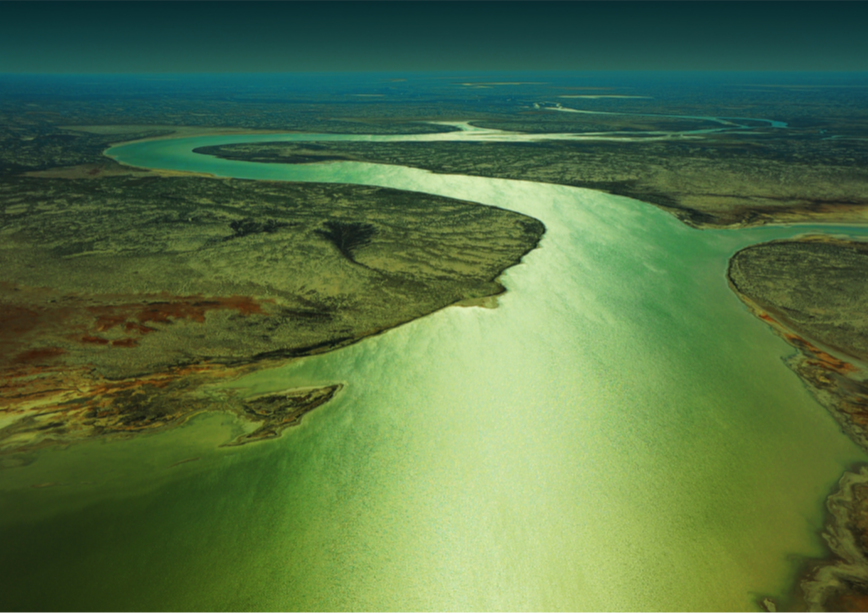-
CENTRES
Progammes & Centres
Location
While it is clear that traditional reductionism present in water governance has led to water conflicts, ‘Water for Peace’ can be achieved by recalibration of IWRM at a basin scale

This article is a part of the essay series: World Water Day 2024: Water for Peace, Water for Life
The theme of World Water Day 2024 is ‘Water for Peace’, highlighting water’s significant role in bringing about global stability and prosperity. Physical scarcity of freshwater, water pollution, iniquitous access and the upstream-downstream dimension of water as a flowing resource have often made water a subject of conflict at various levels. The unbridled race for control over water, beginning from the global to the local levels, has pitched stakeholders at various scales against each other in a battle for dominance over this precious resource. This struggle often escalates into heated conflicts over the right to use or own water, particularly when it crosses boundaries. Transboundary water disputes are not just international—they occur within countries, between states, and even among local communities, stretching down to the smallest societal units. Moreover, definitionally “transboundary” extends beyond geographical to sectoral boundaries, illustrating the complex web of water-related challenges. The most recent form of transboundary water conflict is acknowledged to be between human economic use and natural ecosystem needs. The challenges are getting even more complex with global warming and climate change causing substantial changes in hydrological flow regimes of major river basins of the world, thereby, affecting various ecosystem services provided by water including the food and drinking water provisioning and supporting and regulating services. Given the way water has been the subject of intense conflicts, the theme of World Water Day 2024 pitching water as an instrument of peace seems apt—this will require coordinated efforts and changes in the paradigmatic thinking of water governance.
The word “scarcity” is nearly synonymous with water disputes, stemming from both the limited quantity of potable water and its uneven distribution across the globe. This brings in the “zero-sum” dimension in the entire water game. The distributional disparity is perceptible with regions flush with water and others parched for it. Adding to this are the nuances of “temporal scarcity,” where water scarcity fluctuates with seasonal changes and grows with population and economic expansion, exacerbating the scarcity as demand soars amidst booming urbanisation and industrialisation. In the realm of transboundary waters, the inherently mobile resource complicates the establishment of clear property rights. In many cases, the upstream-downstream water conflicts have been symptomatic of conflicts over definitions of property rights over water.
From an upstream-downstream perspective, the three extreme principles of defining property rights entail the doctrines of history, Harmon and Hobbes. The Harmon doctrine, rooted in the belief that “If water falls on my roof, it belongs to me,” favours those at the water's origin, benefiting upstream users. Similarly, history echoes the “prior appropriation” principle, granting water rights to those who first utilise the resource, regardless of their geographical position. Meanwhile, the Hobbesian doctrine recognises rights established through negotiations among neighbouring water users or riparian states.
The persistent socio-political and economic pressures from water scarcity leading to conflicts at various levels have driven professionals and researchers to rethink water governance paradigms.
The persistent socio-political and economic pressures from water scarcity leading to conflicts at various levels have driven professionals and researchers to rethink water governance paradigms.
This has ignited a global debate, signalling a pivotal shift from conventional water resource development to innovative, sustainable approaches.
The neo-Malthusian creed of “scarcity induces conflicts” is based on a paradigm that looks at water from the perspective of a physically quantified resource that can be stocked and used as per human need. This is what embodies the traditional paradigm of water governance often delineated as arithmetic hydrology, which is inherently reductionist (as it reduces the very complex water paradigm to a numerical figure). Stressors are emerging from the natural ecosystem that can lead to conflicts within human societies, putting environmental security at risk due to disputes between humans and their surroundings—the scarcity of natural resources to meet burgeoning human needs is well-acknowledged. However, what is less acknowledged are the adverse outcomes from human actions that modify natural resource cycles for short-term economic gains, in the name of “development”. Alterations to natural water cycles by humans typically bring long-term negative consequences despite immediate economic benefits, illustrating the complex nature of these interactions. Such actions have detrimentally impacted livelihoods downstream by affecting ecosystem services.
Simon Dalby has pointed out the lack of social-scientific evidence supporting the Malthusian view that environmental scarcity leads to conflict. This Malthusian perspective has also faced criticism from the comprehensive research on “securitisation” by the Copenhagen School. Evidence of conflict over resources can also be seen in the flooding disputes over the Ganges in Bihar in India, or the paradoxical situation of “ample water, ample poverty” regarding the Brahmaputra river in Assam in India. Therefore, the very traditional paradigm that equates addressing water scarcity to water governance is hardly applicable given the changing natures of the challenges. This has led water professionals and researchers to think of newer modes of water governance on the ground that a holistic paradigm needs to replace the fragmented approach to managing water, thereby challenging the reductionist paradigm.
This led to the steady emergence of a new paradigm often paraphrased as Integrated Water Resource Management (IWRM) that looks at water as an integral component of the global eco-hydrological cycle, thereby posing water governance in integration to its interactive dynamics with the human society and the broader basin ecosystem.
There is now a widespread acknowledgement globally that human action on one end of a water body can have serious impacts on the broader basin ecosystem. This led to a spurt in dam decommissioning in large parts of the United States (US) and European Union (EU), once their deleterious impacts were realised. Even institutional mechanisms and market-based instruments started being used in different parts of the world to keep water instream. In Australia, the establishment of water markets across the Murray-Darling Basin, governed by the Murray-Darling Basin Authority, exemplifies an innovative approach to augmenting water efficiency among agricultural practitioners, thereby fostering principles of sustainable water stewardship. In a pioneering move towards mitigating the uncertainties surrounding water availability in California, December 2019 witnessed water derivatives trading on the Chicago Mercantile Exchange.
This initiative marks a strategic pivot towards demand-side water management, counterbalancing the historical precedence of infrastructural adjustments that have significantly reshaped the hydrological dynamics of the region.
The importance lies in the centrality of acknowledging the basin ecosystem as the unit of governance, where IWRM needs to be the guiding principle. This is leading to the emergence of the governance paradigm of Integrated River Basin Governance (IRBG). As such, the canons of IRBG or IWRM at the basin scale are still emerging, but the following points provide a summary of the broad contours of the emerging paradigm.
Water must be reconceptualised as an essential element within the eco-hydrological cycle, emphasising its role as a cyclical flow integral to ecosystem functionality, rather than a finite commodity exploited for human use and convenience.
In the economic realm, water's intrinsic value transcends its diverse applications, necessitating its recognition as a vital economic resource within an expansive ecological-economic framework. This encompasses the valuation of ecosystem services pertinent to water flow and distribution patterns, thereby embedding water within a broader ecological economic context. Importantly, this economic valuation does not override the imperatives of equitable access and affordability from a social justice perspective.
The governance of water resources should be organised around river basins, advocating for a paradigm shift away from the unsustainable premise that economic growth and food security are contingent upon the perpetual increase of water supplies. Instead, the focus should pivot to the adoption of water-saving technologies and innovations.
A holistic evaluation of water development initiatives is imperative, demanding an integrated consideration of the hydrological cycle.
This approach necessitates the cultivation of a transparent, interdisciplinary knowledge base, facilitating a comprehensive understanding of water’s multifaceted roles—socially, ecologically, and economically.
The management and conceptualisation of droughts and floods should be expanded to encompass the broader ecological processes they are part of, urging a systemic understanding of these phenomena within their ecological context.
Advocacy for an integrated policymaking framework is crucial, promoting collaborative decision-making and cost-sharing across diverse sectors within the river basin—including but not limited to industry, agriculture, urban development, and navigation, without compromising the integrity of the basin ecosystem.
This integrated approach should also align with the Sustainable Development Goals (poverty alleviation and ecosystem restoration), through fostering of holistic basin management ethos.
The establishment of a robust, multidisciplinary knowledge repository on river basins is imperative, encapsulating the complex interplay between natural processes and socio-economic dynamics.
Integrating gender perspectives is essential, recognising and empowering women’s critical roles in water management, as underscored in the Dublin Statement.
The above pointers present a scaffold for creating a more modern and state-of-the-art IRBM paradigm. While it is clear that the traditional reductionism in the human thinking of water governance has led to water conflicts, the theme of World Water Day 2024, i.e., ‘Water for Peace’ can be achieved by recalibration of IWRM at a basin scale.
Nilanjan Ghosh is a Director at the Observer Research Foundation
The views expressed above belong to the author(s). ORF research and analyses now available on Telegram! Click here to access our curated content — blogs, longforms and interviews.

Dr Nilanjan Ghosh is Vice President – Development Studies at the Observer Research Foundation (ORF) in India, and is also in charge of the Foundation’s ...
Read More +